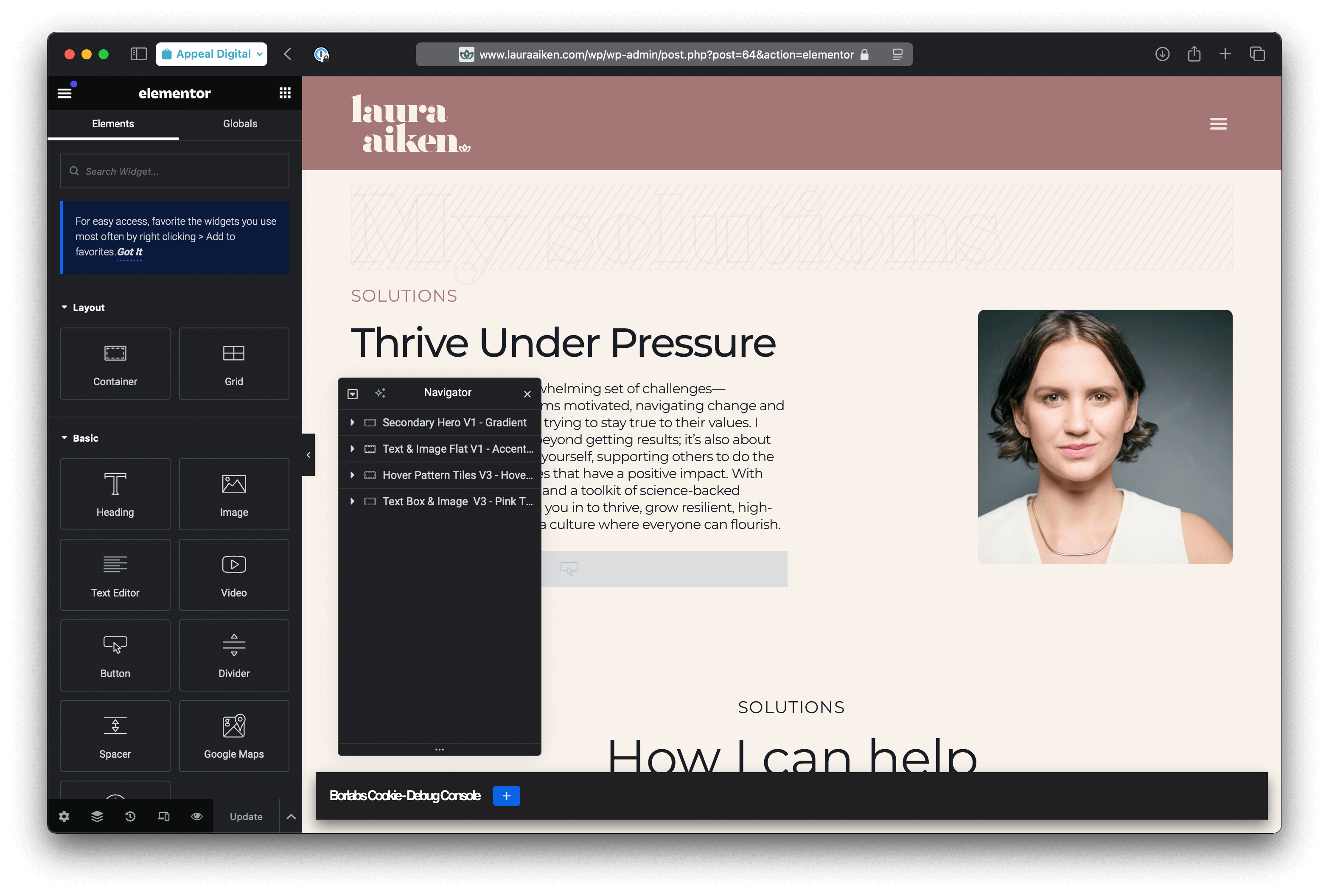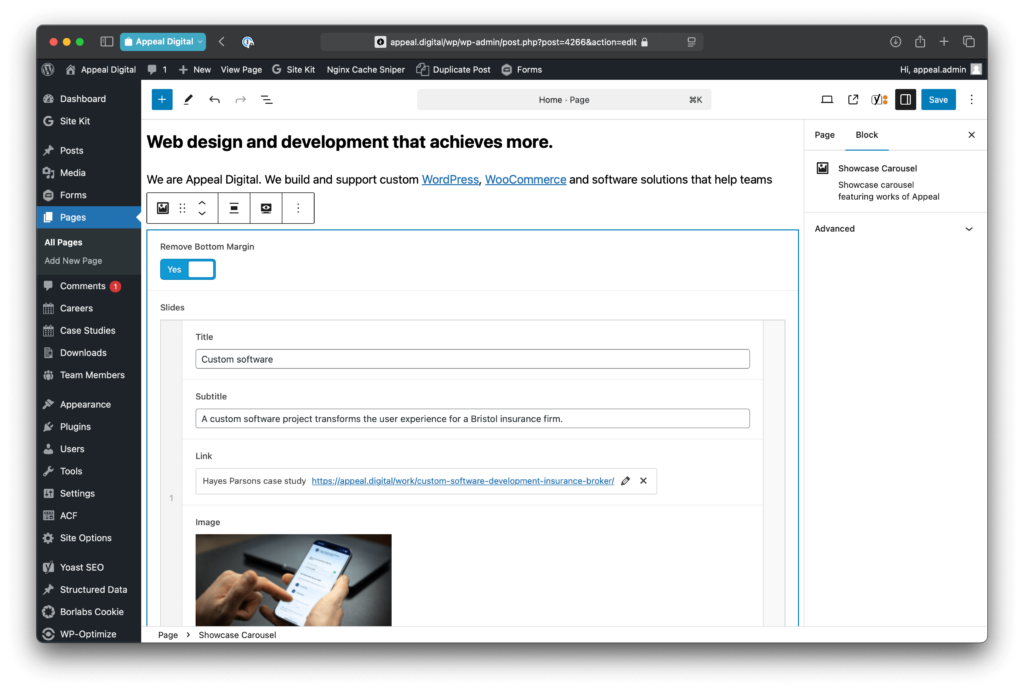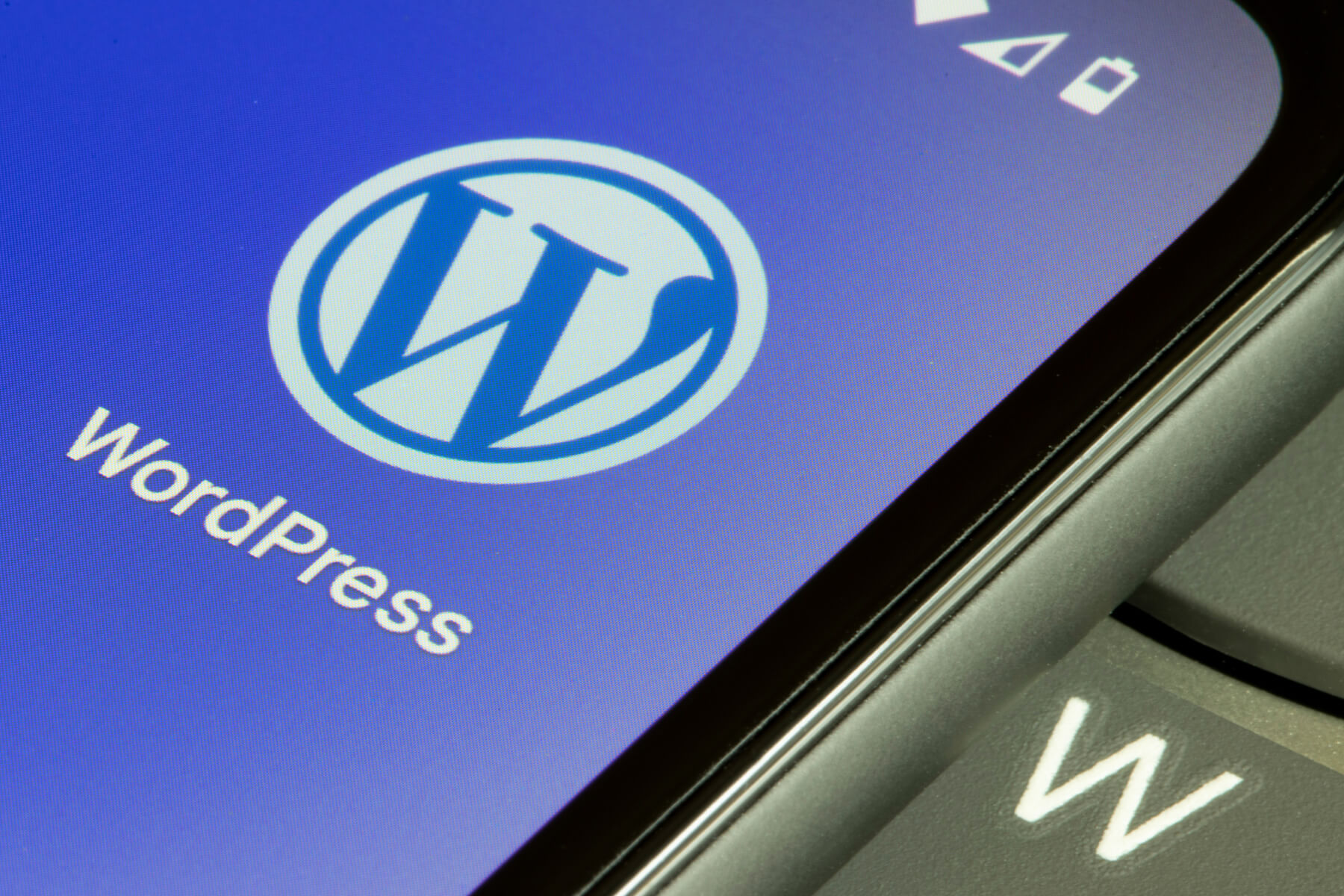Only a few years ago, it was clearer when you could justify using a page builder and when a custom WordPress theme was the best approach for your B2B website.
But now, with page builders advancing and Gutenberg maturing within the WordPress platform, the decision has become more nuanced.
Choosing the right platform for your B2B website will significantly impact your marketing success, user experience and lead generation.
In this article, we’ll compare two popular options for building a B2B WordPress website — Elementor, and a hand coded custom WordPress theme using Gutenberg blocks. We’ll consider everything you’ll need to think about to help you make an informed decision.
Before we dive in, let’s clarify exactly what we’re referring to when we talk about ‘page builders’ and ‘custom WordPress themes’.
What is a ‘page builder’ in WordPress?
A page builder is a tool that enables users to create and design web pages using a visual, drag-and-drop interface, without the need for coding knowledge.
In the context of WordPress, this is usually a plugin that, when installed, provides drag-and-drop functionality to build out page content. Examples of this include Elementor and Divi.

What is a custom WordPress theme?
A custom WordPress theme is a uniquely designed and developed theme specifically tailored to meet the individual requirements, branding, and functional needs of a particular website or client. Unlike pre-made themes or templates available in the WordPress repository or third-party marketplaces, a custom theme is built from scratch (or heavily modified from a boilerplate) by developers to provide a bespoke solution.

Commercial considerations for your next B2B website
Now we’re clear on definitions, let’s get down to the strengths and weaknesses of each solution and which might be best for your organisation.
Brand expression and site customisation
With a custom WordPress theme, the only real limitation is your budget. It offers limitless possibilities – unparalleled creative freedom to fully express your brand, enhanced customisation and an emphasis on your unique positioning and differentiation.
Interestingly, a custom WordPress theme can also help maintain brand consistency. When we develop a custom WordPress theme for a client we’ll aim to lock down core design features – for example, fonts, colours and other brand elements. By developing in this functionality, you avoid the risk of brand drift due to well meaning and enthusiastic team members.
While Elementor and other page builders have made impressive strides in their capabilities, they still come with notable technical limitations when relying exclusively on their toolkit.
Planning a new site?
Get in touch with our team to discuss how we can implement a website to facilitates growth.

Performance and Speed
In writing this article, we conducted keyword research and found one question that frequently arises for Elementor and other page builders:
“How can I make my {page builder} website faster?”
The reason for this common concern lies in the nature of page builders. Their generalised design includes a wide range of features, many of which may go unused, resulting in unnecessary code that slows down performance.
In contrast, a well-written custom WordPress theme is streamlined, containing only the essential code needed for your site’s specific functionality. This lean approach reduces load times and enhances the user experience.
While Elementor’s feature-rich environment provides great flexibility, it can lead to slower page speeds, particularly when multiple widgets and animations are used. Achieving optimal performance often requires additional plugins and optimisation techniques, which add complexity to ongoing management (see the section on maintenance and security for more details).
Hosting and scalability
If you’re heading to the moon, you need a rocket built for the journey. Similarly, a custom WordPress theme is tailored to meet specific requirements – whether that’s managing large datasets, thousands of pages, or advanced content workflows – all without sacrificing performance.
In contrast, page builders like Elementor aren’t optimised for handling heavy traffic or complex enterprise needs. For instance, at the database level, Elementor lacks full control over how WordPress processes queries. This issue becomes even more pronounced on sites with custom queries, high traffic, or extensive content.
If your goal is a website that can scale seamlessly with your enterprise’s growth, a custom WordPress theme is the logical choice.
SEO
Clean, efficient code has a significant positive impact on SEO rankings. Faster load times and optimised code are easier for search engines to crawl, making your site more likely to be favoured in search results.
Here’s how we often explain it:
Imagine two identical local businesses competing online. They have the same content, URL structure, reviews, backlinks – everything is identical.
The only difference? One website is built using Elementor, and the other is a custom WordPress theme.
The custom WordPress theme is the one that will secure the top spot in the search engine results pages (SERPs).
That said, Elementor delivers the vast majority of functional SEO benefits offered by a custom WordPress theme. You get access to the same library of plugins and tools available to the broader WordPress community, making it a powerful option for many businesses.
However, in a competitive or commoditised sector, every advantage counts. A custom WordPress theme therefore gives you the edge you need to stand out and dominate your market.
Maintenance, Security and updates
A custom WordPress theme requires regular maintenance to keep it updated, secure, and running smoothly.
In our experience, sites built with Elementor or other page builders often rely on a greater number of plugins to achieve the functionality required for a modern B2B marketing strategy. This increased reliance on third-party plugins can introduce more security risks and create vulnerabilities if updates are not managed carefully.
Custom themes, on the other hand, tend to offer stronger security. By minimizing dependency on third-party plugins and incorporating tailored security measures specific to the site’s architecture, they provide a more robust foundation for data protection.
That said, page builders are not inherently insecure. When properly managed, they can be just as secure as any other solution. However, we often see challenges arise from poor implementation or reliance on bad practices, which can lead to issues down the line.
Functionality and flexibility
Elementor offers a broad range of customisation options through its intuitive visual interface, making it an excellent choice for rapid development. However, it can fall short for complex or highly unique B2B website requirements, as its capabilities are ultimately constrained by the plugin itself and the available add-ons.
In our experience, combining custom development with Elementor can lead to challenges, including unexpected issues and a tangled technical architecture that complicates long-term management.
By contrast, a custom WordPress theme provides unmatched flexibility. It allows for bespoke designs and tailored functionalities that align precisely with your business needs. This approach not only supports the implementation of unique branding elements but also enables the creation of distinct features that set your B2B website apart in a competitive market.
Ease of Use
This one is controversial and comes down to personal preference. Some of our clients swear by Elementor, praising its drag-and-drop interface. Others find it frustrating and prefer the Gutenberg editor. It often boils down to a mix of personal preference, skill level, and the time available.
In our experience, a well-written custom theme tends to make it faster and more efficient to get pages and content live. By contrast, Elementor can become fiddly and cumbersome, especially when managing larger-scale websites.
That said, for businesses with in-house expertise and a need to launch campaigns quickly—sometimes within the same day — Elementor and other page builders can be an incredibly practical and commercially viable solution.
Which solution is best for you?
Choosing between a page-builder and a custom-coded theme depends on your company’s specific needs, resources, and long-term objectives. A page-builder like Elementor offers ease of use and faster deployment but may come with trade-offs in performance and brand positioning. A custom-coded theme requires a larger initial investment and technical support but provides a tailored solution optimised for longer-term growth.
Here’s the advice we give to clients.
We recommend a custom WordPress theme if:
- You operate in a regulated sector and need greater autonomy and control over security.
- You regularly tender for public sector contracts or have a legal obligation to adhere to strict compliance standards (WCAG for example).
- Your site has (or will grow to have) hundreds or thousands of pages and content types.
- You regularly have high traffic levels or spikes of traffic concurrency and performance and scalability are critical.
- You don’t want to be building another website in three years time. You want something that can evolve and grow with your business.
- You need to integrate your website with other critical business systems or functions. Think deep integrations into your CRP, ERP platform or HR systems.
We recommend Elementor when:
- You want to build a rapid prototype or launch a campaign in an isolated environment and want to test specific messaging and segmentation.
- You’re a start up business with a smaller budget but want a high-quality, professional website that will enable you to build credibility and visibility in the market.
- You’re a new business and you’ve not yet refined your messaging or positioning. You need a solution that can be overhauled in hours, not days, and ideally cost-effectively.
Decision points
- Evaluate Total Cost of Ownership: Look beyond initial development costs to include maintenance, updates, and potential future redesigns.
- Assess Internal Capabilities: If your team lacks technical or design expertise, then a custom WordPress template is infinitely preferable.
- Long-Term Goals: Consider your company’s long-term digital strategy. If you anticipate significant growth or require advanced features, investing in a custom-coded theme early may deliver greater ROI and save time.
- Budget Constraints: Evaluate your budget not just for initial development but also for ongoing maintenance and potential future overhauls.
- Performance Needs: If site speed and performance are critical (e.g., for SEO or user experience reasons), a custom-coded theme is advantageous.
- Brand Differentiation: For industries where brand uniqueness is paramount, a custom design ensures your site doesn’t resemble competitors’.
We’ve built WordPress websites for clients from Hertford to Hong Kong and have experience with both platforms and approaches. If you’re looking for impartial advice or want to learn more, get in touch to discuss what’s best for your organisation.





